2011年广州市中考英语试题(绝密)
2011年广东省中考英语真题卷(含答案)
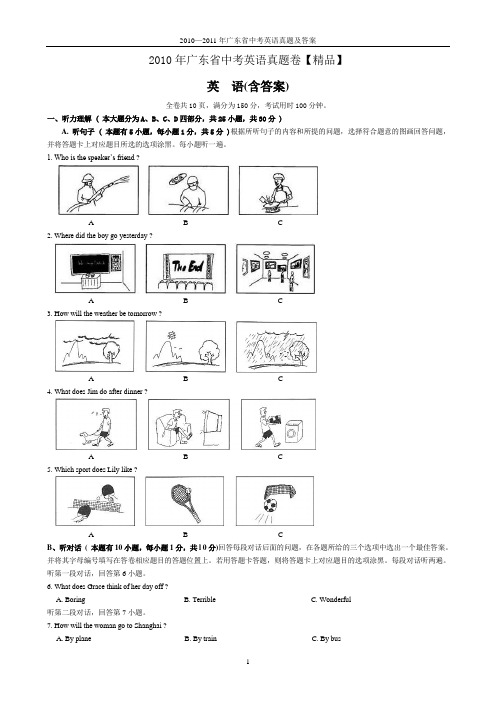
2010年广东省中考英语真题卷【精品】英语(含答案)全卷共10页,满分为150分,考试用时100分钟。
一、听力理解( 本大题分为A、B、C、D四部分,共25小题,共30分 )A. 听句子 ( 本题有5小题,每小题1分,共5分 )根据所听句子的内容和所提的问题,选择符合题意的图画回答问题,并将答题卡上对应题目所选的选项涂黑。
每小题听一遍。
1. Who is the speaker’s friend ?A B C2. Where did the boy go yesterday ?A B C3. How will the weather be tomorrow ?A B C4. What does Jim do after dinner ?A B C5. Which sport does Lily like ?A B CB、听对话( 本题有10小题,每小题1分,共l 0分)回答每段对话后面的问题,在各题所给的三个选项中选出一个最佳答案。
并将其字母编号填写在答卷相应题目的答题位置上。
若用答题卡答题,则将答题卡上对应题目的选项涂黑。
每段对话听两遍。
听第一段对话,回答第6小题。
6. What does Grace think of her day off ?A. BoringB. TerribleC. Wonderful听第二段对话,回答第7小题。
7. How will the woman go to Shanghai ?A. By planeB. By trainC. By bus听第三段对话,回答第八题.8. When will the man get to the hotel ?A. At 10:00B. At 10:15C. At 10:30听第四段对话,回答第9题。
9. What color is the cap ?A. RedB. BlueC. Black听第五段对话,回答第10小题。
10. Why is Paul so successful in his work ?A. Because he never makes any mistakes.B. Because he always thinking of othersC. Because he can answer questions quickly. 听第六段对话,同答第11—12小题。
2011广州中考英语试题(规范标准答案)
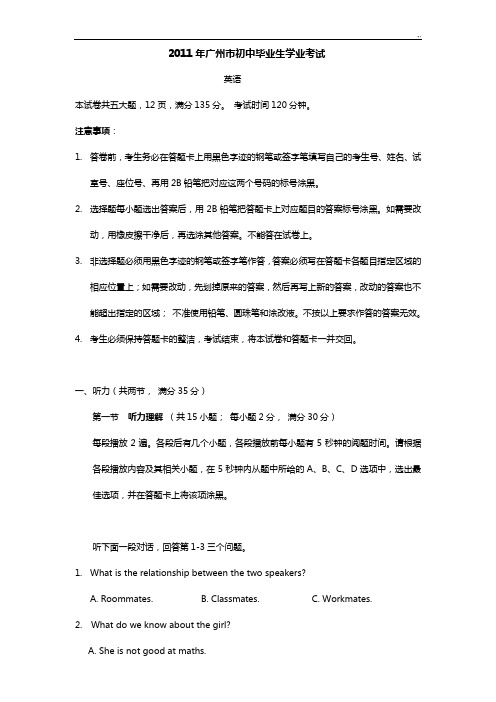
2011年广州市初中毕业生学业考试英语本试卷共五大题,12页,满分135分。
考试时间120分钟。
注意事项:1.答卷前,考生务必在答题卡上用黑色字迹的钢笔或签字笔填写自己的考生号、姓名、试室号、座位号、再用2B铅笔把对应这两个号码的标号涂黑。
2.选择题每小题选出答案后,用2B铅笔把答题卡上对应题目的答案标号涂黑。
如需要改动,用橡皮擦干净后,再选涂其他答案。
不能答在试卷上。
3.非选择题必须用黑色字迹的钢笔或签字笔作答,答案必须写在答题卡各题目指定区域的相应位置上;如需要改动,先划掉原来的答案,然后再写上新的答案,改动的答案也不能超出指定的区域;不准使用铅笔、圆珠笔和涂改液。
不按以上要求作答的答案无效。
4.考生必须保持答题卡的整洁,考试结束,将本试卷和答题卡一并交回。
一、听力(共两节,满分35分)第一节听力理解(共15小题;每小题2分,满分30分)每段播放2遍。
各段后有几个小题,各段播放前每小题有5秒钟的阅题时间。
请根据各段播放内容及其相关小题,在5秒钟内从题中所给的A、B、C、D选项中,选出最佳选项,并在答题卡上将该项涂黑。
听下面一段对话,回答第1-3三个问题。
1.What is the relationship between the two speakers?A. Roommates.B. Classmates.C. Workmates.2. What do we know about the girl?A. She is not good at maths.B. She likes her old English teacher.C. She enjoys going swimming.3. Where will the speaker go next?A. Bookstore.B. Swimming pool.C. Library听下面一段独白,回答第4-6三个问题。
4. What is the talk mainly about?A.The speaker’s hobby.B.Problems with parents.C.Improving writing skills.5.When did the speaker start collecting cartoons?A. At the age of 5.B. 5 years ago.C. 11 years ago.6. What does the speaker want to do in the future?A. Travel to Japan.B. Study Japanese.C. Become a cartoon writer.听下面一段对话,回答第7-9三个小题。
2011广东省中考英语word解析
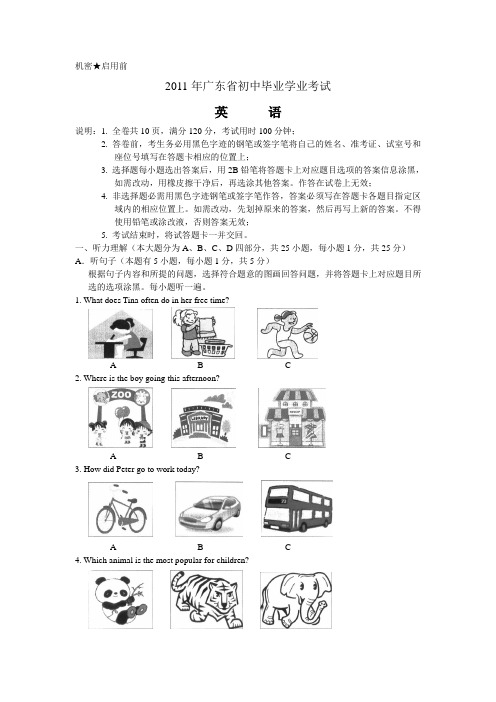
机密★启用前2011年广东省初中毕业学业考试英语说明:1. 全卷共10页,满分120分,考试用时100分钟;2. 答卷前,考生务必用黑色字迹的钢笔或签字笔将自己的姓名、准考证、试室号和座位号填写在答题卡相应的位置上;3. 选择题每小题选出答案后,用2B铅笔将答题卡上对应题目选项的答案信息涂黑,如需改动,用橡皮擦干净后,再选涂其他答案。
作答在试卷上无效;4. 非选择题必需用黑色字迹钢笔或签字笔作答,答案必须写在答题卡各题目指定区域内的相应位置上。
如需改动,先划掉原来的答案,然后再写上新的答案。
不得使用铅笔或涂改液,否则答案无效;5. 考试结束时,将试答题卡一并交回。
一、听力理解(本大题分为A、B、C、D四部分,共25小题,每小题1分,共25分)A.听句子(本题有5小题,每小题1分,共5分)根据句子内容和所提的问题,选择符合题意的图画回答问题,并将答题卡上对应题目所选的选项涂黑。
每小题听一遍。
1. What does Tina often do in her free time?A B C2. Where is the boy going this afternoon?A B C3. How did Peter go to work today?A B C4. Which animal is the most popular for children?A B C5. When did the meeting begin?A B CB. 听对话(本题有10小题,每小题1分,共10分)回答每段对话后面的问题,在各题所给的三个选项中选出一个最佳答案,并将答题卡上的对应题目所选的选项涂黑。
每段对话听两遍。
听第一段对话,回答第6小题。
6. What does the man do?A. A cleanerB. A teacherC. A student听第二段对话,回答第7小题。
7. How much will the woman pay?A. 4.5 yuanB. 5 yuanC. 9 yuan听第三段对话,回答第8小题。
2011年广东省中考英语试卷及答案
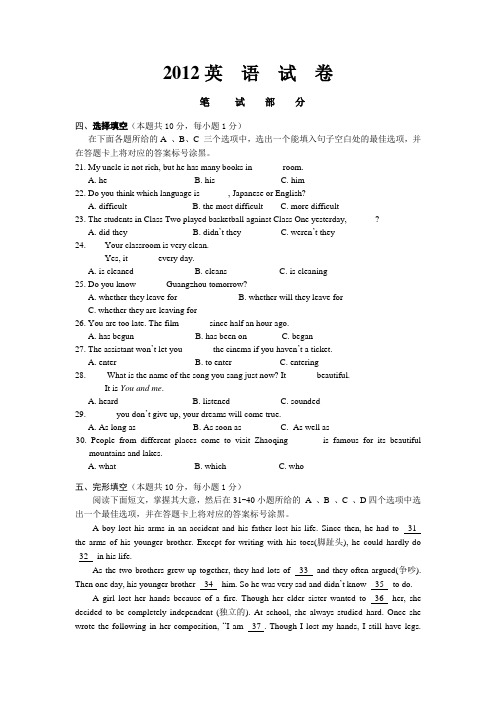
2012英语试卷笔试部分四、选择填空(本题共10分,每小题1分)在下面各题所给的A 、B、C 三个选项中,选出一个能填入句子空白处的最佳选项,并在答题卡上将对应的答案标号涂黑。
21. My uncle is not rich, but he has many books in ______ room.A. heB. hisC. him22. Do you think which language is ______, Japanese or English?A. difficultB. the most difficultC. more difficult23. The students in Class Two played basketball against Class One yesterday, ______?A. did theyB. didn‟t theyC. weren‟t they24. ----- Your classroom is very clean.----- Yes, it ______ every day.A. is cleanedB. cleansC. is cleaning25. Do you know ______ Guangzhou tomorrow?A. whether they leave forB. whether will they leave forC. whether they are leaving for26. You are too late. The film ______ since half an hour ago.A. has begunB. has been onC. began27. The assistant won‟t let you ______ the cinema if you haven‟t a ticket.A. enterB. to enterC. entering28.----- What is the name of the song you sang just now? It ______ beautiful.----- It is You and me.A. heardB. listenedC. sounded29. ______ you don‟t give up, your dreams will come true.A. As long asB. As soon asC.As well as30. People from different places come to visit Zhaoqing ______ is famous for its beautifulmountains and lakes.A. whatB. whichC. who五、完形填空(本题共10分,每小题1分)阅读下面短文,掌握其大意,然后在31-40小题所给的A 、B 、C 、D四个选项中选出一个最佳选项,并在答题卡上将对应的答案标号涂黑。
2011广东广州中考真题英语(含解析)
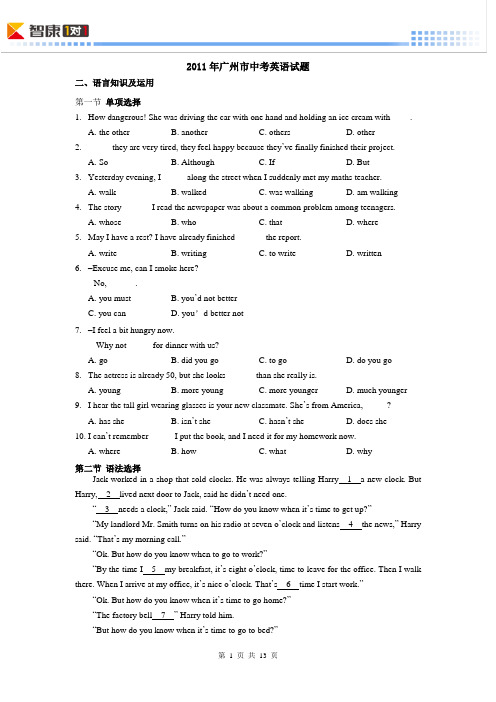
2011年广州市中考英语试题二、语言知识及运用第一节单项选择1. How dangerous! She was driving the car with one hand and holding an ice cream with ____.A. the otherB. anotherC. othersD. other2. _____ they are very tired, they feel happy because they’ve finally finished their project.A. SoB. AlthoughC. IfD. But3. Yesterday evening, I _____ along the street when I suddenly met my maths teacher.A. walkB. walkedC. was walkingD. am walking4. The story ______ I read the newspaper was about a common problem among teenagers.A. whoseB. whoC. thatD. where5. May I have a rest? I have already finished ______ the report.A. writeB. writingC. to writeD. written6. –Excuse me, can I smoke here?--No, ______.A. you mustB. you’d not betterC. you canD. you’d better not7. –I feel a bit hungry now.-- Why not _____ for dinner with us?A. goB. did you goC. to goD. do you go8. The actress is already 50, but she looks ______ than she really is.A. youngB. more youngC. more youngerD. much younger9. I hear the tall girl wearing glasses is your new classmate. She’s from America, _____?A. has sheB. isn’t sheC. hasn’t sheD. does she10. I can’t remember _____ I put the book, and I need it for my homework now.A. whereB. howC. whatD. why第二节语法选择Jack worked in a shop that sold clocks. He was always telling Harry 1 a new clock. But Harry, 2 lived next door to Jack, said he didn’t need one.“ 3 needs a clock,” Jack said. “How do you know when it’s time to get up?”“My landlord Mr. Smith turns on his radio at seven o’clock and listens 4 the news,” Harry said. “That’s my morning call.”“Ok. But how do you know when to go to work?”“By the time I 5 my breakfast, it’s eight o’clock, time to leave for the office. Then I walk there. When I arrive at my office, it’s nice o’clock. That’s 6 time I start work.”“Ok. But how do you know when it’s time to go home?”“The factory bell 7 ” Harry told him.“But how do you know when it’s time to go to bed?”“The television programs come to end.”By now Jack was really 8 “Ok,” he shouted. “Now tell me what would happen 9 you woke up in the middle of the night and wanted to know the time.”“That’s easy,” Harry said, “I would knock heavily on 10 wall. Then you would shout at me, ‘What are you doing knocking on my wall at three o’clock in the morning?’”1. A. to buy B. buying C. bought D. buy2. A. which B. whose C. that D. who3. A. No one B. Neither one C. Everyone D. Someone4. A. at B. to C. in D. on5. A. eats B. have eaten C. ate D. was eating6. A. a B. an C. the D. 不填7. A. ring B. rings C. was rung D. ringing8. A. anger B. angrily C. angry D. angering9. A. if B. that C. why D. how10. A. his B. their C. her D. your三、完形填空It was the last day of school and I planned to travel to my friend’s hometown. I hadn’t seen him for years and this was a good 1 to meet him again.I was busy at school so it was rather 2 when I came back home. It was already 10 o’clock at night. Time was running out. After a hurried meal I left 3 I found a taxi very soon. Asking the driver to drive me fast to the station, I relaxed for a while, imagining what my friend looked like now. I was soon at the station and was sure that I would be able to 4 the train. Unfortunately, I fell on the way and lost some time. To my complete 5 , when I reached the platform, I saw that the train had just left! It was the last train so I had to 6 home.My mother was glad to see me back as she had a feeling about my trip. But I was unhappy. I tried to relax and went to bed but I had a 7 sleep. The next morning I was very tired. As I was having breakfast the 8 arrived. I read over the pages and was shocked to 9 that the train I missed had had an accident. How 10 I was that I missed the train!1. A. sign B. chance C. sense D. dream2. A. strange B. cold C. late D. quiet3. A. Finally B. Suddenly C. Strangely D. Luckily4. A. stop B. see C. catch D. miss5. A. satisfaction B. hope C. surprise D. joy6. A. call B. leave C. reach D. return7. A. deep B. bad C. great D. heavy8. A. newspaper B. ticket C. mild D. train9. A. find B. hear C. feel D. remember10. A. hopeful B. thankful C. careful D. painful四、阅读理解AOne day a man saw an old lady standing by her expensive car, clearly in need of help. So he stopped his old truck and got out. Although he was smiling, the old lady was worried. Was he gong to hurt her? He didn’t look safe.The man could see that she was frightened, so in his friendliest voice he said, “I’m here to help you, madam. Why don’t you wait in the car where it’s warm? By the way, my name is Bryan Anderson.” Bryan quickly fixed the car and the lady thanked him. Then she asked how much she should pay him.But Bryan wanted no money. He was just giving a hand to someone in trouble. This was normal for him. He said, “I f you really want to repay me, next time you see someone in need, help them and think of me.”After saying goodbye, the lady continued down the road until she reached a small café where she decided to stop for something to eat. As the pretty waitress took her order, the lady noticed she was nearly eight months pregnant(怀孕). Although the waitress looked tired she was very kind. As the lady was going to pay the $10 bill she remembered Bryan’s words.She paid with a hundred-dollar bill. But when the waitress returned with the change the lady was gone. On the table she saw a small note. There were tears in her eyes when she read it: “Somebody once helped me the way I’m helping you. If you want to pay me back, continue being kind to others.” Under the note were nine more $100 bills.Was the old lady an angel? The waitress was so excited that she called her husband to tell him the news. “Bryan Anderson my dear…you’re not going to believe what just happened…”1. When the lady saw Bryan, she was worried because she thought_____.A. he may hurt herB. he wasn’t going to stopC. he couldn’t help herD. she didn’t have enough money2. What can we learn about the old lady from the story?A. She was never kind to others.B. She was usually quite careless.C. She was probably very rich.D. She was not a very good driver.3. The underlined expression “giving a hand to (Paragraph 3) is closest in meaning to “____”.A. questioningB. helpingC. hurtingD. calling4. The underlined word “it” (Paragraph 5) refers to “____”.A. the changeB. the billC. the noteD. the order5. Which of the following shows the relationship between the man, the lady and the waitress?BFrankenstein is one of the world’s most famous horror stories. It’s about a doctor who creates a new man from the body parts of dead people and brings it to life. But the experiment goes wrong and the monster(怪兽) kills the doctor and many others. The story has been read by millions since it was first published and in the last hundred years it has been made into dozens of movies. Many people are surprised to learn its writer was a 19-year-old woman, called Mary Shelley.Mary was born into a rich London family in August 1797. She was educated by her parents and when she was 13 decided to become a writer. In 1812, she met the famous writer Percy Shelley and they soon got married. Sadly for Mary, their first child died soon after birth in Italy. In her diary, Mary wrote about a dream: “I dreamt that my little baby came to life again—that it had only been cold and that we rubbed it before the fire and it lived.”In 1816, Percy Shelley and 19-year-odl May visited the poet Lord Byron at his home in Switzerland. Because of the bad weather they stayed indoors reading horror stories. One night, Byron asked everyone to write their own story. Mary thought of her dream and wrote the story Frankenstein.Frankenstein was published when Mary was 21, and became a huge success. Many people didn’t think a 19-year-old woman could write so well and believed her husband was the real writer.Although famous, Shelley’s life was full of sadness. Only one of her four children lived and in 1822 her husband died in a swimming accident. Mary was broken-hearted and decided not to marry again. She devoted herself to her child and continued to write until her death in 1851.1. What do we know about the story Frankenstein?A. It was really written by Mary Shelley’s husband.B. It was been read by millions of people.C. It was written to remember Shelley’s husband.D. It is the most famous story in the world.2. Where was Mary Shelley when she wrote the story Frankenstein?A. In England.B. In Italy.C. In Switzerland.D. In France.3. In which order to the following take place?a. Bad weather made everyone stay indoors reading horror stories.b. The story Frankenstein was first published.c. Mary wrote about a dream in her diary.d. Mary met the famous writer Percy Shelley.e. Movies based on the story of Frankenstein were made.A. a, c, b, e, dB. d, c, a, b, eC. c, a, b, d, eD. b, a, d, c, e4. How old was Mary Shelley when she died?A. 43B. 48C. 51D. 545. What can we learn about Mary Shelley from this passage?A. She experienced a lot of sadness in her life.B. She wasn’t considered a good writer during her life.C. She was educated at her local school.D. She became very rich because of the story Frankenstein.CI am a professor of sports and exercise so I often deal with nervousness in my research with sports people. Actually, most people experience nervousness at some time or another.If you are feeling anxious, my advice is to first find the cause or causes. Make a list of those things that are making you nervous and work out which ones you can do something about. Focus all of your efforts on managing the causes that you can control.Most people cannot tell the difference between controllable(可控制的) and uncontrollable causes, so things they can control become a big reason for nervousness. Dealing with this is very important if people want to keep a healthy mind.Simply try to accept the uncontrollable causes of nervousness. You might be worried about the weather on a big day, an accident or an attack on the train, or perhaps just things that other people are doing at work. The results may be very important but there is still no use worrying because you can’t control any of these things. Accept that you can’t control everything. Once you understand this, it becomes easier not to worry.If a situation, such as swimming, is causing you to be anxious, try to face it as often as possible so that you can get used to it.It can often help to think about yourself doing the thing that makes you nervous—then close your eyes and imagine it going well. Imagine how the flight or job interview is going to happen sothat you can get used to it. This will help you understand that the thing you fear most is probably not going to happen.1. Who wrote this passage?A. A reporter.B. A sportsman.C. A patient.D. A professor.2. The writer thinks there is no use worrying about some causes of nervousness because____.A. most are not very importantB. they are not the real causes of the problemC. they cannot be controlled by peopleD. it’s better to deal with one cause at a time3. If swimming makes you nervous, what should you do according to the writer?A. Go swimming often to get used to it.B. Avoid going to the swimming pool.C. Find a swimming teacher.D. Imagine watching others swim.4. What is true about nervousness according to the passage?A. It usually has only one cause.B. It is usually caused by people.C. People can easily manage it.D. Most people suffer from it.5. What is the main purpose of this passage?A. To introduce the writer’s sports experience.B. To advise on how to deal with nervousness.C. To help people remember their fears.D. To explain the dangers of nervousness.DWelcome to the 2012 London Olympic Games!Archery Archery has a 10,000 year history, when bows and arrowswere first used for hunting and war.Archery first appeared at the Paris Olympics of 1990. It wasremoved after 1908 and only returned to the Olympics atMunich in 1972.Did you know?In the 14th century, archery was so important that as Englishlaw required every man, aged seven to 60, to practice it.Badminton This sport was invented by British soldiers in India whocalled it Poono, the same name as the town in which theylived.It was first played at the Olympics in 1992 at Barcelona.Although the rules of the modern sport were developed inEngland, Asian countries are now the best.Did you know?The best balls are said to be made from the feathers of theleft wing of goose.Football There are two medal competitions for Olympic football, onefor men’s teams and one for women’s.Football was first played at the 1908 Olympic Games and ithas been played at every Olympic Games ever since, exceptfor Los Angeles 1932.Did you know?Hungary has won three football gold medals-more than anyother country.Taekwondo This Korean sport’s name means “the way of the hand andfoot”. The players get points by hitting each other with thesetwo parts of the body only. The players mustn’t lie on thefloor and no equipment can be used.Taekwondo first appeared at the 2000 Sydney Games.Did you know?Over 60 million people from 190 countries around the worldregularly take part in this sport.1. Who invented the sport of badminton?A. Indians.B. British.C. Chinese.D. Koreans.2. Which of these sports appeared earliest at the Olympics?A. Archery.B. Badminton.C. Taekwondo.D. Football.3. Which sport was first named after a town?A. Badminton.B. Football.C. Taekwondo.D. Archery.4. Which of the following picture shows the sport of “Taekwondo”?c5. Where can you most probably find web page?A. Sydney B. Beijing C. Guangzhou D. London 五、写作第一节单词拼写1. What a p______! I failed the chemistry exam again.2. My sister often helps me with my homework. She is very h___3. It has been sunny all day, so I don’t think it will r_____ tomorrow.4. If you are f___ this afternoon, let’s go shopping.5. Listen carefully and a____ my question.第二节完成句子1. 实际上,我一点都不喜欢他的新发型。
2011年广东省广州市中考英语试卷(答案+解析)
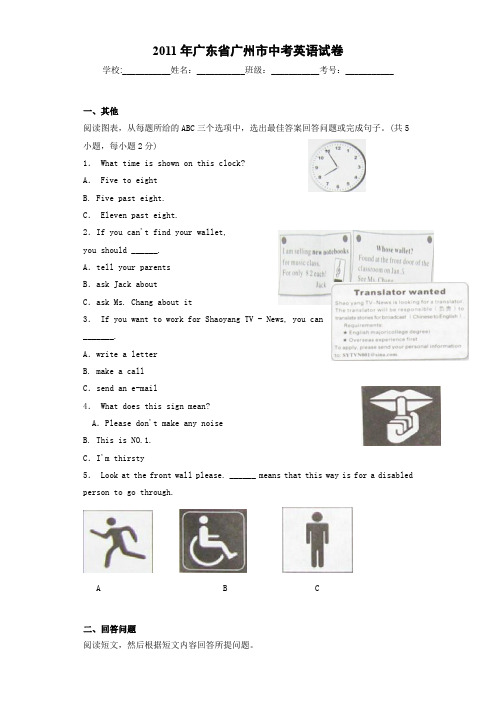
2011年广东省广州市中考英语试卷学校:___________姓名:___________班级:___________考号:___________一、其他阅读图表,从每题所给的ABC三个选项中,选出最佳答案回答问题或完成句子。
(共5小题,每小题2分)1. What time is shown on this clock?A. Five to eightB. Five past eight.C. Eleven past eight.2.If you can't find your wallet,you should ______.A.tell your parentsB.ask Jack aboutC.ask Ms. Chang about it3. If you want to work for Shaoyang TV - News, you can_______.A.write a letterB. make a callC.send an e-mail4. What does this sign mean?A.Please don't make any noiseB. This is NO.1.C.I'm thirsty5. Look at the front wall please. ______ means that this way is for a disabled person to go through.A B C二、回答问题阅读短文,然后根据短文内容回答所提问题。
Two Chinese farmers sang "in the spring" in their small room after drinking in a late August evening in Beijing. A friend put their song on the Internet. And soon they became stars around China.Wang Xu,44, is from Henan, and Liu Gang, 29, is from Heilongjiang. They areamong the millions of farmers who have gone to the cities to work."Although nobody pays attention to the music, I am singing happily, on streets, under bridges or in wild country, with no credit card, no girlfriend or a home with hot water, but only a guitar.” They sing, “It is just like the life we live now.” Wang said, “We are poor farmers, and you know people won’t care about us."Their song is loved by millions of Chinese, including the people who are also from the countryside. Many people said they cried after listening to the song.Wang came to Beijing in 2000 and has tried many jobs. Each month after he paid 600yuan for the house and bought food, there was little money left. "I love music, and also want to make more money." Wang said. "I never dreamed of standing on such a big stage.”Liu came to Beijing in 2002. "I wanted to try my luck in the big city." He said. And now their dreams of music have come true. They are really theluckiest of all the timers inChina. 6.Where is Liu Gang from?7.Have their dreams of music come true?8.When was Wang Xu bom?9.Why did Liu Gang come to Beijing in 2002?10.What do you think of the two farmer singers?三、阅读单选阅读短文,根据短文内容,在表中填入相应信息。
英语_2011年广东省广州市中考英语试卷(含答案)

2011年广东省广州市中考英语试卷二、语言知识及运用(共两节,满分10分)第一节单项选择(共10小题;每小题1分,满分10分)从16~25各题所给的A、B、C和D项中,选出可以填入空白处的最佳选项,并在答题卡上将该项涂黑.1. How dangerous!She was driving the car with one hand and holding an ice cream with____.()A the otherB anotherC othersD other2. _____ they are very tired,they feel happy because they've finally finished their project.()A SoB AlthoughC IfD But3. Yesterday evening,I _____ along the street when I suddenly met my maths teacher.()A walkB walkedC was walkingD am walking4. The story ______ I read in the newspaper was about a common problem among teenagers.()A whoseB whoC thatD where5. May I have a rest?I have already finished ______ the report.()A writeB writingC to writeD written6. ﹣Excuse me,can I smoke here?﹣﹣No,______.()A you mustB you'd not betterC you canD you'd better not7. ﹣I feel a bit hungry now.﹣﹣Why not _____ for dinner with us?()A goB did you goC to goD do you go8. The actress is already 50, but she looks ______ than she really is.A youngB more youngC more youngerD much younger9. I hear the tall girl wearing glasses is your new classmate.She's from America,_____?()A has sheB isn't sheC hasn't sheD does she10. I can't remember ______ I put the book, and I need it for my homework now.A whereB howC whatD why第二节语法选择(共1小题;每小题10分,满分10分)阅读下面短文,按照句子结构的语法性和上下文连贯的要求,从26~35各题所给的A、B、C和D项中选出最佳选项,并在答题卡上将该项涂黑.11. Jack worked in a shop that sold clocks.He was always telling Harry(1)_______a new clock.But Harry, (2)_______lived next door to Jack, said he didn't need one."(3)_______needs a clock, "Jack said."How do you know when it's time to get up? ""My landlord Mr.Smith turns on his radio at seven o'clock and listens(4)_______the news, "Harry said."That's my morning call.""Ok.But how do you know when to go to work? ""By the time I(5)_______my breakfast, it's eight o'clock, time to leave for the office.ThenI walk there.When I arrive at my office, it's nice o'clock.That's(6)_______time I start work.""Ok.But how do you know when it's time to go home? ""The factory bell(7)_______"Harry told him."But how do you know when it's time to go to bed? ""The television programs come to end."By now Jack was really(8)_______."Ok, "he shouted."Now tell me what would happen (9)_______you woke up in the middle of the night and wanted to know the time.""That's easy, "Harry said, "I would knock heavily on(10)_______wall.Then you would shout at me, ‘What are you doing knocking on my wall at three o'clock in the morning? '"(1)A to buyB buyingC boughtD buy(2)A whichB whoseC thatD who(3)A No oneB Neither oneC EveryoneD Someone(4)A atB toC inD on(5)A eatsB have eatenC ateD was eating(6)A aB anC theD 不填(7)A ringB ringsC was rungD ringing(8)A angerB angrilyC angryD angering(9)A ifB thatC whyD how(10)A hisB theirC herD your三、完形填空(共1小题;每小题10分,满分10分)阅读下面短文,掌握其大意,然后从36~45各题所给的A、B、C和D项中,选出最佳选项,并在答题卡上将该项涂黑.12. It was the last day of school and I planned to travel to my friend's hometown.I hadn't seen him for years and this was a good(1)_______to meet him again.I was busy at school so it was rathe(2)_______when I came back home.It was already 10o'clock at night.Time was running out.After a hurried meal I left(3)_______I found a taxi very soon.Asking the driver to drive me fast to the station, I relaxed for awhile, imagining what my friend looked like now.I was soon at the station and was sure that I would be able to (4)_______the train.Unfortunately, I fell on the way and lost some time.To my complete(5)_______, when I reached the platform, I saw that the train had just left!It was the last train so I had to(6)_______home.My mother was glad to see me back as she had a feeling about my trip.But I was unhappy.I tried to relax and went to bed but I had a(7)_______sleep.The next morning I was very tired.As I was having breakfast the(8)_______arrived.I read over the pages and was shocked to(9)_______that the train I missed had had an accident.(10)_______I was that I missed the train!(1)A signB chanceC senseD dream(2)A strangeB coldC lateD quiet(3)A FinallyB SuddenlyC StrangelyD Luckily(4)A stopB seeC catchD miss(5)A satisfactionB hopeC surpriseD joy(6)A callB leaveC reachD return(7)A deepB badC greatD heavy(8)A newspaperB ticketC mildD train(9)A findB hearC feelD remember(10)A hopefulB thankfulC carefulD painful四、阅读理解阅读下列短文,从每题所给的A、B、C和D项中,选出最佳选项,并在答题卡上将该选项涂黑.13.One day a man saw an old lady standing by her expensive car, clearly in need of help. So he stopped his old truck and got out. Although he was smiling, the old lady was worried. Was he gong to hurt her? He didn't look safe.The man could see that she was frightened, so in his friendliest voice he said, "I'm here to help you, madam. Why don't you wait in the car where it's warm? By the way, my name is Bryan Anderson." Bryan quickly fixed the car and the lady thanked him. Then she asked how much she should pay him.But Bryan wanted no money. He was just giving a hand to someone in trouble. This was normal for him. He said, "If you really want to repay me, next time you see someone in need, help them and think of me."After saying goodbye, the lady continued down the road until she reached a small cafe where she decided to stop for something to eat. As the pretty waitress took her order, the lady noticed she was nearly eight months pregnant(怀孕). Although the waitress looked tired she was very kind. As the lady was going to pay the $10 bill she remembered Bryan's words. She paid with a hundred-dollar bill. But when the waitress returned with the change the lady was gone. On the table she saw a small note. There were tears in her eyes when she read it. "Some body once helped me the way I'm helping you. If you want to pay me back, continue being kind to others." Under the note were nine more 100 bills.Was the old lady an angel? The waitress was so excited that she called her husband to tell him the news. "Bryan Anders on my dear…you're not going to believe what just happened…"(1)When the lady saw Bryan, she was worried because she thought ______.A he may hurt her.B he wasn't going to stop.C he couldn't help her.D she didn't have enough money.(2)What can we learn about the old lady from the story?A She was never kind to others.B She was usually quite careless.C She was probabl y very rich.D She was not a very good driver.(3)The underlined word "it"(Paragraph 5)refers to "______".A the changeB the billC the noteD the orderThe underlined expression "giving a hand to(Paragraph 3)" is closest in meaning to"______".A questioningB helpingC hurtingD calling14. Frankenstein is one of the world's most famous horror stories.It's about a doctor who creates a new man from the body parts of dead people and brings it to life.But theexperiment goes wrong and the monster(怪兽) kills the doctor and many others.The story has been read by millions since it was first published and in the last hundred years it has been made into dozens of movies.Many people are surprised to learn its writer was a 19﹣year﹣old woman, called Mary Shelley.Mary was born into a rich London family in August 1797.She was educated by her parents and when she was 13decided to become a writer.In 1812, she met the famous writer Percy Shelley and they soon got married.Sadly for Mary, their first child died soon after birth in Italy.In her diary, Mary wrote about a dream: "I dreamt that my little baby came to life again﹣that it had only been cold and that we rubbed it before the fire and it lived."In 1816, Percy Shelley and 19﹣year﹣odl May visited the poet Lord Byron at his home in Switzerland.Because of the bad weather they stayed indoors reading horror stories.One night, Byron asked everyone to write their own story.Mary thought of her dream and wrote the story Frankenstein.Frankenstein was published when Mary was 21, and became a huge success.Many people didn't think a 19﹣year﹣old woman could write so well and believed her husband was the real writer.Although famous, Shelley's life was full of sadness.Only one of her four children lived and in 1822her husband died in a swimming accident.Mary was broken﹣hearted and decided not to marry again.She devoted herself to her child and continued to write until her death in 1851.(1)What do we know about he story Frankenstein?________A It was really written by Mary Shelley's husband.B It was been read by millions of people.C It was written to remember Shelley's husband.D It is the most famous story in the world.(2)Where was Mary Shelley when she wrote the story Frankenstein?________A In England.B In Italy.C In Switzerland.D In France.(3)In which order to the following take place?________a.Bad weather made everyone stay indoors reading horror stories.b.The story Frankenstein was first published.c.Mary wrote about a dream in her diary.d.Mary met the famous writer Percy Shelley.e.Movies based on the story of Frankenstein were made.A a,c,b,e,d B. C c,a,b,d,e D.(4)How old was Mary Shelley when she died?________A 43 B. C 51 D.(5)What can we learn about Mary Shelley from this passage?________A She experienced a lot of sadness in her life.B She wasn't considered a good writerduring her life. C She was educated at her local school. D She became very rich because of the story Frankenstein.15. I am a professor of sports and exercise so I often deal with nervousness in my research with sports people.Actually, most people experience nervousness at some time or another. If you are feeling anxious, my advice is to first find the cause or causes.Make s list of those things that are making you nervous and work out which ones you can do something about.Focus all of your efforts on managing the causes that you can control.Most people cannot tell the difference between controllable(可控制的) and uncontrollable causes, so things they can's control become a big reason for nervousness.Dealing with this is very important if people want to keep a healthy mind.Simply try to accept the uncontrollable causes of nervousness.You might be worried about the weather on a big day, an accident or an attack on the train, or perhaps just things that other people are doing at work.The results may be very important but there is still no use worrying because you can't control any of these things.Accept that you can't control everything.Once you understand this, it becomes easier not to worry.If a situation, such as swimming, is causing you to be anxious, try to face it as often as possible so that you can get used to it.It can often help to think about yourself doing the thing that makes you nervous﹣then close your eyes and imagine it going well.Imagine how the flight or job interview is goingto happen so that you can get used to it.This will help you understand that the thing you fear most is probably not going to happen.(1)Who wrote this passage?________A A reporter.B A sportsman.C A patient.D A professor.(2)The writer thinks there is no use worrying about some causes of nervousness because________.A most are not very important.B they are not the real causes of theproblem. C they cannot be controlled by people. D it's better to deal with one cause at a time.(3)If swimming makes you nervous,what should you do according to the writer?________A Go swimming often to get used to it.B Avoid going to the swimmingpool. C Find a swimming teacher. D Imagine watching others swim.(4)What is true about nervousness according to the passage?________A It usually has only one cause.B It is usually caused by people.C People can easily manage it.D Most people suffer from it.(5)What is the main purpose of this passage?________A To introduce the writer's sports experience.B To advise on how to deal with nervousness.C To help people remember their fears.D To explain the dangers of nervousness.Olympic Games!ArcheryBadmintonFootballTaekwondo(1)Who invented the sport of badminton?________A Indians.B British.C Chinese.D Koreans.(2)Which of these sports appeared earliest at the Olympics?________A Archery.B Badminton.C Taekwondo.D Football.(3)Which sport was first named after a town?________A Badminton.B Football.C Taekwondo.D Archery.(4)Which of the following picture shows the sport of"Taekwondo"?________(5)Where can you most probably find web page?________A Sydney 2000.B Beijing 2008.C Guangzhou 2010.D London 2012.五、写作(共三节,满分5分)第一节单词拼写(共5小题,每小题1分,满分5分)根据下列句子及所给单词的首字母写出所缺单词.在填答卷时,要求写出完整单词.(没空限填一词)17. What a p________!I failed the chemistry exam again.18. My sister often helps me with my homework.She is very h________.19. It has been sunny all day,so I don't think it will r________tomorrow.20. If you are f________this afternoon,let's go shopping.21. Listen carefully and a________my question.第二节完成句子(共5小题,每小题2分,满分10分)根据所给的汉语内容,用英语完成下列句子.(每空限填一词)22. 实际上,我一点都不喜欢他的新发型.________,I don't like his new hairstyle at all.23. 父亲和我都喜欢看篮球比赛.________ my father________ I love watching basketball matches.24. 时间过得真快啊!________ the time passed!25. 我想知道为什么你今天上学又迟道了.I want to know________ late for school again today.26. 学生们每周都清洁教室的窗户.The classroom windows________ by the students every week.第三节书面表达(共1题,满分15分)27. 最近,你班就"你的理想职业"展开了一次调查.下表是你们小组的情况请根据表格内容写一篇英语短文,向英语校刊投稿.注意:(1)词数80左右(短文的开头和结尾已给出,不计入词数);(2)不得透露学校、姓名等任何个人信息,否则不予评分.Recently we did a survey in our class in order to learn about students'ideal jobs.Here's a report about my group members'ideas.…Hopefully everyone can realize their dreams in the future.2011年广东省广州市中考英语试卷答案1. A2. B3. C4. C5. B6. D7. A8. D9. B10. A11. ADCBBCBCAD12. BCDCCDBAAB13. ACCB14. BCBDA15. DCADB16. BAACD17. ity18. elpful19. ain20. ree21. nswer22. In fact23. Both,and24. How fast25. why you are26. are cleaned27. Recently we did a survey in our class in order to learn about students'ideal jobs.Here'sa report about my group members'ideas.Mary wants to be a fashion designer because she likes beautiful clothes and is good at drawing.Kate wants to be agardener,she likes plants,she wants to make the cities better.Mike would like to be a writer.He'd like to share hiswonderful stories with others.Tom would like to be a cook.He'd like to cook delicious food for others.I would like to be a policeman.I want to protect the people safe.Hopefully everyone can realize their dreams in the future.。
2011年广东省广州市中考英语试题及答案 副本
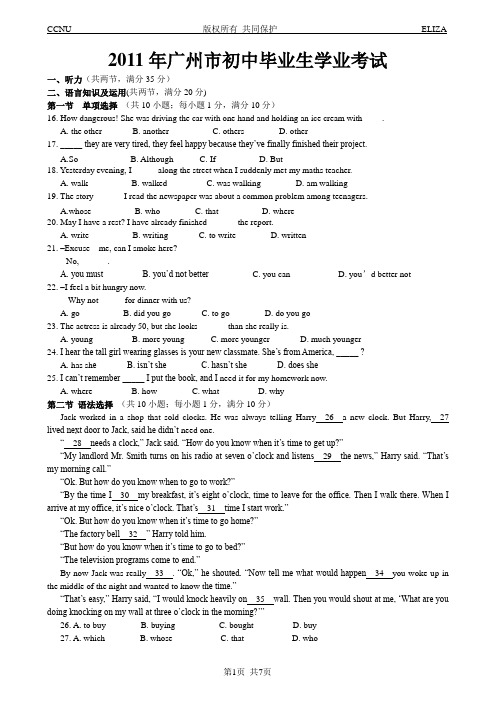
2011年广州市初中毕业生学业考试一、听力(共两节,满分35分)二、语言知识及运用(共两节,满分20分)第一节单项选择(共10小题;每小题1分,满分10分)16. How dangerous! She was driving the car with one hand and holding an ice cream with ____.A. the otherB. anotherC. othersD. other17. _____ they are very tired, they feel happy because they‘ve finally finished their project.A.SoB. AlthoughC. IfD. But18. Yesterday evening, I _____ along the street when I suddenly met my maths teacher.A. walkB. walkedC. was walkingD. am walking19. The story ______ I read the newspaper was about a common problem among teenagers.A.whoseB. whoC. thatD. where20. May I have a rest? I have already finished ______ the report.A. writeB. writingC. to writeD. written21. –Excuse me, can I smoke here?--No, ______.A. you mustB. you‘d not betterC. you canD. you’d better not22. –I feel a bit hungry now.-- Why not _____ for dinner with us?A. goB. did you goC. to goD. do you go23. The actress is already 50, but she looks ______ than she really is.A. youngB. more youngC. more youngerD. much younger24. I hear the tall girl wearing glasses is your new classmate. She‘s from America, _____ ?A. has sh eB. isn‘t sheC. hasn‘t sheD. does she25. I can‘t remember _____ I put the book, and I need it for my homew ork now.A. whereB. howC. whatD. why第二节语法选择(共10小题;每小题1分,满分10分)Jack worked in a shop that sold clocks. He was always telling Harry26a new clock. But Harry,27lived next door to Jack, said he didn‘t need one.―28needs a clock,‖ Jack said. ―How do you know when it‘s time to get up?‖―My landlord Mr. Smith turns on his radio at seven o‘clock and listens29the news,‖ Harry said. ―That‘s my morning call.‖―Ok. But how do you know when to go to work?‖―By the time I30my breakfast, it‘s eight o‘clock, time to leave for the office. Then I walk there. When I arrive at my office, it‘s nice o‘clock. That‘s31time I start work.‖―Ok. But how do you know when it‘s time to go home?‖―The factory bell32‖ Harry told him.―But how do you know when it‘s time to go to bed?‖―The television programs come to end.‖By now Jack was really33. ―Ok,‖ he shouted. ―Now tell me what would happen34you woke up in the middle of the night and wanted to know the time.‖―That‘s easy,‖ Harry said, ―I would knock heavily on35wall. Then you would shout at me, ‗What are you doing knocking on my wall at three o‘clock in the morning?‘‖26.A. to buy B. buying C. bought D. buy27.A. which B. whose C. that D. who28. A. No one B. Neither one C. Everyone D. Someone29. A. at B. to C. in D. on30. A. eats B. have eaten C. ate D. was eating31. A. a B. an C. the D.不填32. A. ring B. rings C. was rung D. ringing33. A. anger B. angrily C. angry D. angering34. A. if B. that C. why D. how35. A. his B. their C. her D. your三、完形填空(共10小题;每小题1分,满分10分)It was the last day of school and I planned to travel to my friend‘s hometown. I hadn‘t seen him for years and this was a good36to meet him again.I was busy at school so it was rather37when I came back home. It was alr eady 10 o‘clock at night. Time was running out. After a hurried meal I left.38I found a taxi very soon. Asking the driver to drive me fast to the station, I relaxed for a while, imagining what my friend looked like now. I was soon at the station and was sure that I would be able to 39the train. Unfortunately, I fell on the way and lost some time. To my complete40, when I reached the platform, I saw that the train had just left! It was the last train so I had to41home.My mother was glad to see me back as she had a feeling about my trip. But I was unhappy. I tried to relax and went to bed but I had a42sleep. The next morning I was very tired. As I was having breakfast the43arrived. I read over the pages and was shocked to44that the train I missed had had an accident. How45I was that I missed the train!36.A. sign B. chance C. sense D. dream37.A. strange B. cold C. late D. quiet38.A. Finally B. Suddenly C. Strangely D. Luckily39. A. stop B. see C. catch D. miss40. A. satisfaction B. hope C. surprise D. joy41. A. call B. leave C. reach D. return42. A. deep B. bad C. great D. heavy43. A. newspaper B. ticket C. mild D. train44. A. find B. hear C. feel D. remember45. A. hopeful B. thankful C. careful D. painful四、阅读理解(A )One day a man saw an old lady standing by her expensive car, clearly in need of help. So he stopped his old truck and got out. Although he was smiling, the old lady was worried. Was he gong to hurt her? He didn‘t look safe.The man could see that she was frightened, so in his friendliest voice he said, ―I‘m here to help you, madam. Why don‘t you wait in the car where it‘s warm? By the way, my name is Bryan Anderson.‖ Bryan quickly fixed the car and the lady thanked him. Then she asked how much she should pay him.But Bryan wanted no money. He was just giving a hand to someone in trouble. This was normal for him. He said, ―If you really want to repay me, next time you see someone in need, help them and think of me.‖After saying goodbye, the lady continued down the road until she reached a small café where she decided to stop for something to eat. As the pretty waitress took her order, the lady noticed she was nearly eight months pregnant(怀孕). Although the waitress looked tired she was very kind. As the lady was going to pay the $10 bill she remembered Bryan‘s words.She paid with a hundred-dollar bill. But when the waitress returned with the change the lady was gone. On the table she saw a small note. There ware tears in her eyes when she read it: ―Somebody once helped me the way I‘mhelping you. If you want to pay me back, continue being kind to others.‖ Under the note were nine more $100 bills.Was the old lady an angel? The waitress was so excited that she called her husband to tell him the news. ―Bryan Anderson my dear…you‘re n ot going to believe what just happene d…‖46. When the lady saw Bryan, she was worried because she thought_____ .A. he may hurt herB. he wasn‘t going to stopC. he couldn‘t help herD. she didn‘t have enough money47. What can we learn about the old lady from the story?A. She was never kind to others.B. She was usually quite careless.C. She was probably very rich.D. She was not a very good driver.48. The underlined expression ―giving a hand to(Paragraph 3)is closest in meaning to ―____‖.A. questioningB. helpingC. hurtingD. calling49. The underlined word ―it‖ (Paragraph 5) refers to ―____‖.A. the changeB. the billC. the noteD. the order50. Which of the following shows the relationship between the man, the lady and the waitress?(B)Frankenstein is one of the world‘s most famous horror stories. It‘s about a doctor who creates a new man from the body parts of dead people and brings it to life. But the experiment goes wrong and the monster(怪兽) kills the doctor and many others. The story has been read by millions since it was first published and in the last hundred years it has been made into dozens of movies. Many people are surprised to learn its writer was a 19-year-old woman, called Mary Shelley.Mary was born into a rich London family in August 1797. She was educated by her parents and when she was 13 decided to become a writer. In 1812, she met the famous writer Percy Shelley and they soon got married. Sadly for Mary, their first child died soon after birth in Italy. In her diary, Mary wrote abo ut a dream: ―I dreamt that my little baby came to life again—that it had only been cold and that we rubbed it before the fire and it lived.‖In 1816, Percy Shelley and 19-year-odl May visited the poet Lord Byron at his home in Switzerland. Because of the bad weather they stayed indoors reading horror stories. One night, Byron asked everyone to write their own story. Mary thought of her dream and wrote the story Frankenstein.Frankenstein was published when Mary was 21, and became a huge success. Many people didn‘t think a 19-year-old woman could write so well and believed her husband was the real writer.Although famous, Shelley‘s life was full of sadness. Only one of her four children lived and in 1822 herhusband died in a swimming accident. Mary was broken-hearted and decided not to marry again. She devoted herself to her child and continued to write until her death in 1851.51. What do we know about he story Frankenstein?A. It was really written by Mary Shelley‘s husband.B. It was been read by millions of people.C. It was written to remember Shelley‘s husband.D. It is the most famous story in the world.52. Where was Mary Shelley when she wrote the story Frankenstein?A. In England.B. In Italy.C. In Switzerland.D. In France.53. In which order to the following take place?a. Bad weather made everyone stay indoors reading horror stories.b. The story Frankenstein was first published.c. Mary wrote about a dream in her diary.d. Mary met the famous writer Percy Shelley.e. Movies based on the story of Frankenstein were made.A. a, c, b, e, dB. d, c, a, b, eC. c, a, b, d, eD. b, a, d, c, e54. How old was Mary Shelley when she died?A. 43B. 48C.51D. 5455. What can we learn about Mary Shelley from this passage?A. She experienced a lot of sadness in her life.B. She wasn‘t considered a good writer during her life.C. She was educated at her local school.D. She became very rich because of the story Frankenstein.(C)I am a professor of sports and exercise so I often deal with nervousness in my research with sports people. Actually, most people experience nervousness at some time or another.If you are feeling anxious, my advice is to first find the cause or causes. Make s list of those things that are making you nervous and work out which ones you can do something about. Focus all of your efforts on managing the causes that you can control.Most people cannot tell the difference between controllable(可控制的) and uncontrollable causes, so things they ca n‘s control become a big reason for nervousness. Dealing with this is very important if people want to keep a healthy mind.Simply try to accept the uncontrollable causes of nervousness. You might be worried about the weather on a big day, an accident or an attack on the train, or perhaps just things that other people are doing at work. The results may be very important but there is still no use worrying because you can‘t control any of these things. Accept that you can‘t control everything. Once you unders tand this, it becomes easier not to worry.If a situation, such as swimming, is causing you to be anxious, try to face it as often as possible so that you can get used to it.It can often help to think about yourself doing the thing that makes you nervous—then close your eyes and imagine it going well. Imagine how the flight or job interview is going to happen so that you can get used to it. This will help you understand that the thing you fear most is probably not going to happen.56. Who wrote this passage?A. A reporter.B. A sportsman.C. A patient.D. A professor.57. The writer thinks there is no use worrying about some causes of nervousness because____.A. most are not very importantB. they are not the real causes of the problemC. they cannot be controlled by peopleD. it‘s better to deal with one cause at a time58. If swimming makes you nervous, what should you do according to the writer?A. Go swimming often to get used to it.B. Avoid going to the swimming pool.C. Find a swimming teacher.D. Imagine watching others swim.59. What is true about nervousness according to the passage?A. It usually has only one cause.B. It is usually caused by people.C. People can easily manage it.D. Most people suffer from it.60. What is the main purpose of this passage?A. To introduce the writer‘s sports experience.B. To advise on how to deal with nervousness.C. To help people remember their fears.D. To explain the dangers of nervousness.(D)A. Indians.B. British.C. Chinese.D. Koreans.62. Which of these sports appeared earliest at the Olympics?A. Archery.B. Badminton.C. Taekwondo.D. Football.63. Which sport was first named after a town?A. Badminton.B. Football.C. Taekwondo.D. Archery.64. Which of the following picture shows the sport of ―Taekwondo‖?A. B. C. D.65. Where can you most probably find web page?A. Sydney B. Beijing C. Guangzhou D. London 五、写作(共三节,满分30分)第一节单词拼写(共5小题,每小题1分,满分5分)根据下列句子及所给单词的首字母写出所缺单词。
2011广州中考英语试题(答案)
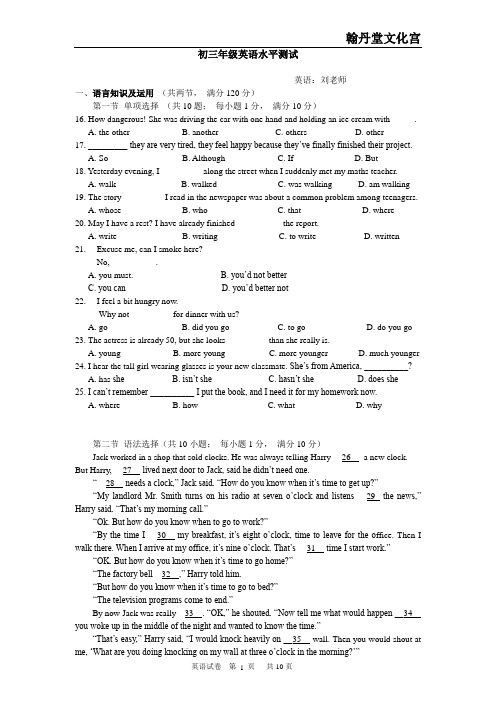
初三年级英语水平测试英语:刘老师一、语言知识及运用(共两节,满分120分)第一节单项选择(共10题;每小题1分,满分10分)16. How dangerous! She was driving the car with one hand and holding an ice cream with _____.A. the otherB. anotherC. othersD. other17. _________ they are very tired, they feel happy because they‟ve finally finished their project.A. SoB. AlthoughC. IfD. But18. Y esterday evening, I _________ along the street when I suddenly met my maths teacher.A. walkB. walkedC. was walkingD. am walking19. The story _________ I read in the newspaper was about a common problem among teenagers.A. whoseB. whoC. thatD. where20. May I have a rest? I have already finished __________ the report.A. writeB. writingC. to writeD. written21. ---Excuse me, can I smoke here?---No, __________.A. you must.B. you‟d not betterC. you canD. you‟d better not22. ---I feel a bit hungry now.--- Why not _________ for dinner with us?A. goB. did you goC. to goD. do you go23. The actress is already 50, but she looks _________ than she really is.A. youngB. more youngC. more youngerD. much younger24. I hear the tall girl wearing glasses is your new classmate. She‟s from America, __________?A. has sheB. isn‟t sheC. hasn‟t sheD. does she25. I can‟t remember __________ I put the book, and I need it for my homework now.A. whereB. howC. whatD. why第二节语法选择(共10小题;每小题1分,满分10分)Jack worked in a shop that sold clocks. He was always telling Harry __26_ a new clock. But Harry, __27__ lived next door to Jack, said he didn‟t need one.“__28__ needs a clock,” Jack said. “How do you know when it‟s time to get up?”“My landlord Mr. Smith turns on his radio at seven o‟clock and listens __29_ the news,” Harry said. “That‟s my morning call.”“Ok. But how do you know when to go to work?”“By the time I __30__ my breakfast, it‟s eight o‟clock, time to leave for the o ffice. Then I walk there. When I arrive at my office, it‟s nine o‟clock. That‟s __31__ time I start work.”“OK. But how do you know when it‟s time to go home?”“The factory bell__32__,” Harry told him.“But how do you know when it‟s time to go to bed?”“The television programs come to end.”By now Jack was really__33__. “OK,” he shouted. “Now tell me what would happen __34__ you woke up in the middle of the night and wanted to know the time.”“That‟s easy,” Harry said, “I would knock heavily on __35__ wall. Then you would shout at me, …What are you doing knocking on my wall at three o‟clock in the morning?‟”26. A. to buy B. buying C. bought D. buy27. A. which B. whose C. that D. who28. A. No one B. Neither one C. Everyone D. Someone29. A. at B. to C. in D. on30. A. eats B. have eaten C. ate D. was eating31. A. a B. an C. the D. 不填32. A. ring B. rings C. was rung D. ringing33. A. anger B. angrily C. angry D. angering34. A. if B. that C. why D. how35. A. his B. their C. her D. your二、完形填空(共10小题;每小题1分,满分10分)阅读下面短文,掌握其大意,然后从36-4各题所给的A、B、C和D项中,选出最佳选项,并在答题卡上将该项涂黑。
2011年广东中考英语真题及答案(有分析和例文)
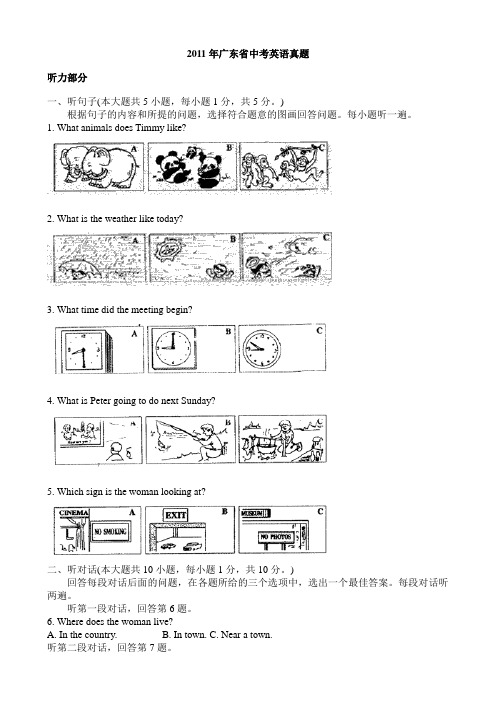
2011年广东省中考英语真题听力部分一、听句子(本大题共5小题,每小题1分,共5分。
)根据句子的内容和所提的问题,选择符合题意的图画回答问题。
每小题听一遍。
1. What animals does Timmy like?2. What is the weather like today?3. What time did the meeting begin?4. What is Peter going to do next Sunday?5. Which sign is the woman looking at?二、听对话(本大题共10小题,每小题1分,共10分。
)回答每段对话后面的问题,在各题所给的三个选项中,选出一个最佳答案。
每段对话听两遍。
听第一段对话,回答第6题。
6. Where does the woman live?A. In the country.B. In town.C. Near a town.听第二段对话,回答第7题。
7. What are the woman and the man talking about?A. Going shopping.B. Their meal this evening.C. Going fishing.听第三段对话,回答第8题。
8. When will the man have to return the book?A. On Monday.B. On Tuesday.C. On Wednesday.听第四段对话,回答第9题。
9. Where is the man learning French? A. In England. B. In the USA.C. hi France.听第五段对话,回答第10题。
10. What is the woman going to do?A. To take a bus.B. To post letters.C. To see a doctor.听第六段对话,回答第11—12题。
2011年广东省中考英语试题(含答案)
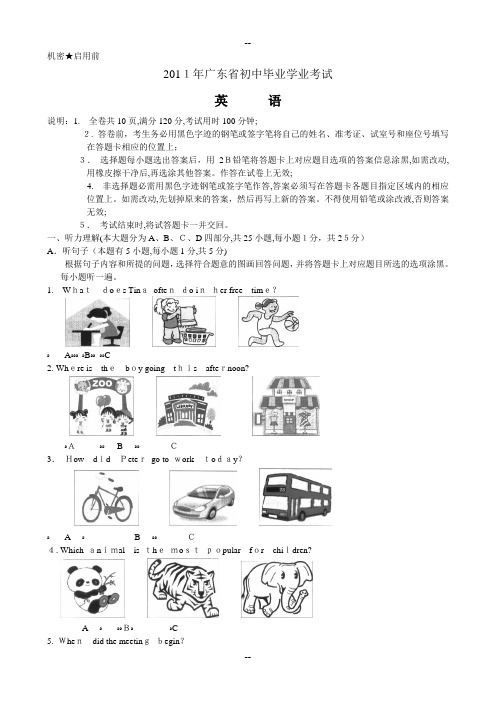
机密★启用前2011年广东省初中毕业学业考试英语说明:1.全卷共10页,满分120分,考试用时100分钟;2. 答卷前,考生务必用黑色字迹的钢笔或签字笔将自己的姓名、准考证、试室号和座位号填写在答题卡相应的位置上;3.选择题每小题选出答案后,用2B铅笔将答题卡上对应题目选项的答案信息涂黑,如需改动,用橡皮擦干净后,再选涂其他答案。
作答在试卷上无效;4.非选择题必需用黑色字迹钢笔或签字笔作答,答案必须写在答题卡各题目指定区域内的相应位置上。
如需改动,先划掉原来的答案,然后再写上新的答案。
不得使用铅笔或涂改液,否则答案无效;5.考试结束时,将试答题卡一并交回。
一、听力理解(本大题分为A、B、C、D四部分,共25小题,每小题1分,共25分)A.听句子(本题有5小题,每小题1分,共5分)根据句子内容和所提的问题,选择符合题意的图画回答问题,并将答题卡上对应题目所选的选项涂黑。
每小题听一遍。
1.Whatdoes Tinaoftendo inher free time?ﻩAﻩﻩﻩﻩBﻩﻩﻩﻩC2. Where is theboy going this afternoon?ﻩAﻩﻩ B ﻩﻩC3.How didPetergo to worktoday?ﻩ A ﻩ B ﻩﻩC4. Which animal is themostpopular for children?A ﻩﻩﻩBﻩﻩC5. Whendid the meetingbegin?ﻩ A ﻩﻩ B ﻩﻩCB. 听对话(本题有10小题,每小题1分,共10分)回答每段对话后面的问题,在各题所给的三个选项中选出一个最佳答案,并将答题卡上的对应题目所选的选项涂黑。
每段对话听两遍。
听第一段对话,回答第6小题。
6.What does the man do?ﻩA. A cleanerﻩﻩﻩB.A teacherﻩﻩC. Astudent听第二段对话,回答第7小题。
7. How much will the woman pay?A. 4.5yuanﻩﻩﻩB.5yuanﻩﻩC.9 yuan听第三段对话,回答第8小题。
广州市2011年初中毕业生学业考试英语
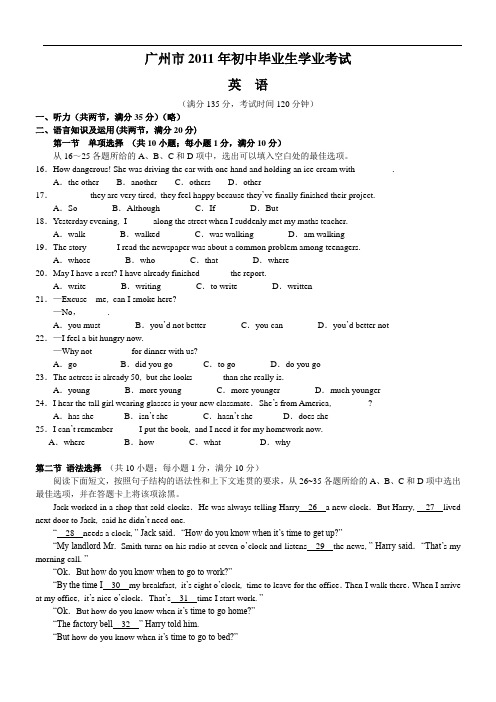
广州市2011年初中毕业生学业考试英语(满分135分,考试时间120分钟)一、听力(共两节,满分35分)(略)二、语言知识及运用(共两节,满分20分)第一节单项选择(共10小题;每小题1分,满分10分)从16~25各题所给的A、B、C和D项中,选出可以填入空白处的最佳选项。
16.How dangerous! She was driving the car with one hand and holding an ice cream with ________.A.the other B.another C.others D.other17.________ they are very tired, they feel happy because they‟ve finally finished their project.A.So B.Although C.If D.But18.Yesterday evening, I _____ along the street when I suddenly met my maths teacher.A.walk B.walked C.was walking D.am walking19.The story ______ I read the newspaper was about a common problem among teenagers.A.whose B.who C.that D.where20.May I have a rest? I have already finished ______ the report.A.write B.writing C.to write D.written21.—Excuse me, can I smoke here?—No,______.A.you must B.you‟d not better C.you can D.you‟d better not22.—I feel a bit hungry now.—Why not ________ for dinner with us?A.go B.did you go C.to go D.do you go23.The actress is already 50, but she looks ______ than she really is.A.young B.more young C.more younger D.much younger24.I hear the tall girl wearing glasses is your new classmate.She‟s from America, _______ ?A.has she B.isn‟t she C.hasn‟t she D.does she25.I can‟t remember _____ I put the book, and I need it for my homework now.A.where B.how C.what D.why第二节语法选择(共10小题;每小题1分,满分10分)阅读下面短文,按照句子结构的语法性和上下文连贯的要求,从26~35各题所给的A、B、C和D项中选出最佳选项,并在答题卡上将该项涂黑。
2011广州中考英语
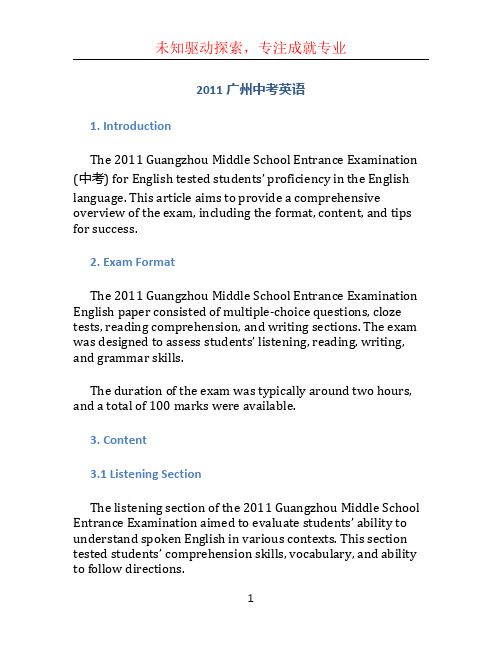
2011广州中考英语1. IntroductionThe 2011 Guangzhou Middle School Entrance Examination (中考) for English tested students’ proficiency in the English language. This article aims to provide a comprehensive overview of the exam, including the format, content, and tips for success.2. Exam FormatThe 2011 Guangzhou Middle School Entrance Examination English paper consisted of multiple-choice questions, cloze tests, reading comprehension, and writing sections. The exam was designed to assess students’ listening, read ing, writing, and grammar skills.The duration of the exam was typically around two hours, and a total of 100 marks were available.3. Content3.1 Listening SectionThe listening section of the 2011 Guangzhou Middle School Entrance Examination aimed to eva luate students’ ability to understand spoken English in various contexts. This section tested students’ comprehension skills, vocabulary, and ability to follow directions.3.2 Reading SectionThe reading section included a variety of texts, such as news articles, advertisements, and fictional stories. Students were required to answer questions based on the texts, including vocabulary, main ideas, and inferential comprehension.3.3 Writing SectionThe writing section assessed students’ ability to communicate effectively in written English. Students were given a prompt and asked to write an essay or a letter, expressing their opinions, or providing information.3.4 Grammar SectionThe grammar section of the exam focused on testing students’ understanding of va rious grammatical concepts. This section included multiple-choice questions, which required students to choose the correct grammatical structure or word form.3.5 Vocabulary and Cloze TestThe vocabulary section aimed to assess students’ knowledge and understanding of English words and phrases. The cloze test section evaluated students’ ability to comprehend a text and fill in the correct words into the gaps.4. Tips for SuccessHere are some tips to help you prepare for and excel in the 2011 Guangzhou Middle School Entrance Examination English paper:1.Practice listening to English audio materialsregularly to improve your listening skills.2.Read English texts, such as books, newspapers, ormagazines, to improve your reading comprehension.3.Expand your vocabulary by learning new words andphrases every day.4.Review grammar rules and practice applying themin different contexts.5.Take mock exams or practice tests to familiarizeyourself with the exam format and time constraints.6.Develop a study schedule and allocate dedicatedtime to each section of the exam.7.Focus on accuracy and clarity when writing youressays or letters.8.Pay attention to spelling and punctuation errors inyour writing.9.Avoid rushing through the exam; manage your timewisely to ensure you have enough time for each section.10.Finally, stay calm and confident during the exam.Trust in your preparation and give your best effort.5. ConclusionThe 2011 Guangzhou Middle School Entrance Examination English paper was designed to assess students’ ove rall English language proficiency. By understanding the exam format, content, and implementing effective study strategies, students could prepare adequately and boost their chances of success. Remember to practice regularly, manage your time well, and remain confident during the exam. Good luck!。
广州市中考英语试题及答案.doc
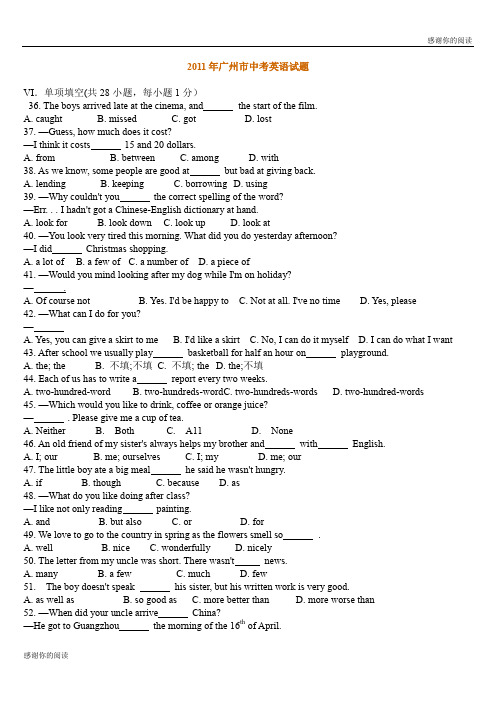
2011年广州市中考英语试题VI.单项填空(共28小题,每小题1分)36. The boys arrived late at the cinema, and the start of the film.A. caughtB. missedC. gotD. lost37. —Guess, how much does it cost?—I think it costs 15 and 20 dollars.A. fromB. betweenC. amongD. with38. As we know, some people are good at but bad at giving back.A. lendingB. keepingC. borrowingD. using39. —Why couldn't you the correct spelling of the word?—Err. . . I hadn't got a Chinese-English dictionary at hand.A. look forB. look downC. look upD. look at40. —You look very tired this morning. What did you do yesterday afternoon?—I did Christmas shopping.A. a lot ofB. a few ofC. a number ofD. a piece of41. —Would you mind looking after my dog while I'm on holiday?—.A. Of course notB. Yes. I'd be happy toC. Not at all. I've no timeD. Yes, please42. —What can I do for you?—A. Yes, you can give a skirt to meB. I'd like a skirtC. No, I can do it myselfD. I can do what I want43. After school we usually play basketball for half an hour on playground.A. the; theB. 不填;不填C. 不填; theD. the;不填44. Each of us has to write a report every two weeks.A. two-hundred-wordB. two-hundreds-wordC. two-hundreds-wordsD. two-hundred-words45. —Which would you like to drink, coffee or orange juice?— . Please give me a cup of tea.A. NeitherB. BothC. A11D. None46. An old friend of my sister's always helps my brother and with English.A. I; ourB. me; ourselvesC. I; myD. me; our47. The little boy ate a big meal he said he wasn't hungry.A. ifB. thoughC. becauseD. as48. —What do you like doing after class?—I like not only reading painting.A. andB. but alsoC. orD. for49. We love to go to the country in spring as the flowers smell so .A. wellB. niceC. wonderfullyD. nicely50. The letter from my uncle was short. There wasn't news.A. manyB. a fewC. muchD. few51. The boy doesn't speak his sister, but his written work is very good.A. as well asB. so good asC. more better thanD. more worse than52. —When did your uncle arrive China?—He got to Guangzhou the morning of the 16th of April.A. at; inB. in; inC. to; onD. in; on53. The food my country is quite different that here.A. in; likeB. to; fromC. from; toD. in; from54. way it is from Guangzhou to Paris!A. How longB. What a longC. How a longD. What long55. —I take some photos in the hall?—No, you .A. Can; needn'tB. Must ; mustn'tC. Could; won'tD. May; mustn't56. —What is the weather like this summer here?—There very little rain.A. hasB. has beenC. areD. have been57. If you carefully, you the report well.A. will listen; will be understoodB. will listen; understandC. listen; will understandD. listen; understand58. They about eight hundred English words by the end of last term.A. will learnB. had learnedC. are going to learnD. have learned59. Excuse me, sir. Could you tell me ?A. where is the bank nearestB. where is the nearest bankC. where the nearest bank isD. the nearest bank is where60. —How did the accident happen?—You know, it difficult to see the road clearly because it .A. was; was rainingB. is; has rainedC. is; is rainingD. will be; will rain61. —Hi, Tom! Can you tell me when for London?—Yes, tomorrow afternoon.A. leavingB. leavesC. to leaveD. are you leaving62. Don't worry. All the children by the nurses.A. are well taken care ofB. take good care ofC. are taken good careD. take good care63. Have you your new classmates yet?A. had friends withB. made friend withC. got friend toD. made friends with69. A. old B. difficult C. free D. clear70. A. arm-chair B. window C. house D. road71. A. arrived B. fought C. left D. returned72. A. so B. for C. and D. but73. A. up and down B. again and again C. hour after hour D. from side to sideVIII.阅读理解(共12小题,每小题1分)阅读下面的短文,然后根据短文内容选择最佳答案。
2011广东省中考英语word解析
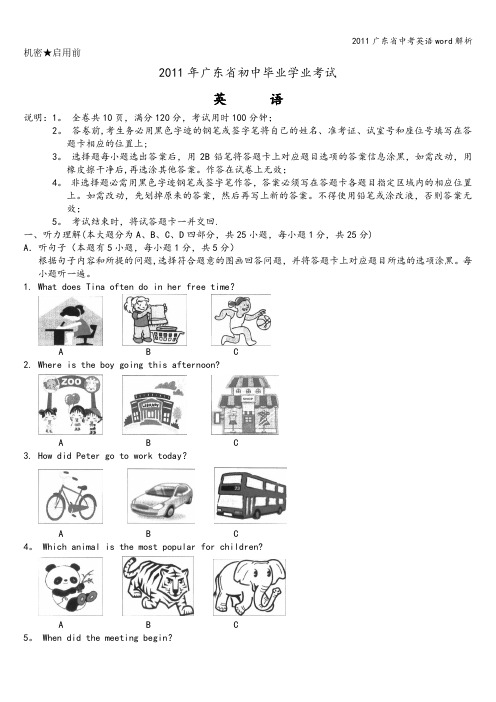
机密★启用前2011年广东省初中毕业学业考试英语说明:1。
全卷共10页,满分120分,考试用时100分钟;2。
答卷前,考生务必用黑色字迹的钢笔或签字笔将自己的姓名、准考证、试室号和座位号填写在答题卡相应的位置上;3。
选择题每小题选出答案后,用2B铅笔将答题卡上对应题目选项的答案信息涂黑,如需改动,用橡皮擦干净后,再选涂其他答案。
作答在试卷上无效;4。
非选择题必需用黑色字迹钢笔或签字笔作答,答案必须写在答题卡各题目指定区域内的相应位置上。
如需改动,先划掉原来的答案,然后再写上新的答案。
不得使用铅笔或涂改液,否则答案无效;5。
考试结束时,将试答题卡一并交回.一、听力理解(本大题分为A、B、C、D四部分,共25小题,每小题1分,共25分)A.听句子(本题有5小题,每小题1分,共5分)根据句子内容和所提的问题,选择符合题意的图画回答问题,并将答题卡上对应题目所选的选项涂黑。
每小题听一遍。
1. What does Tina often do in her free time?A B C2. Where is the boy going this afternoon?A B C3. How did Peter go to work today?A B C4。
Which animal is the most popular for children?A B C5。
When did the meeting begin?A B CB。
听对话(本题有10小题,每小题1分,共10分)回答每段对话后面的问题,在各题所给的三个选项中选出一个最佳答案,并将答题卡上的对应题目所选的选项涂黑。
每段对话听两遍。
听第一段对话,回答第6小题。
6。
What does the man do?A。
A cleaner B。
A teacher C. A student听第二段对话,回答第7小题。
7。
How much will the woman pay?A. 4.5 yuanB. 5 yuanC. 9 yuan听第三段对话,回答第8小题。
- 1、下载文档前请自行甄别文档内容的完整性,平台不提供额外的编辑、内容补充、找答案等附加服务。
- 2、"仅部分预览"的文档,不可在线预览部分如存在完整性等问题,可反馈申请退款(可完整预览的文档不适用该条件!)。
- 3、如文档侵犯您的权益,请联系客服反馈,我们会尽快为您处理(人工客服工作时间:9:00-18:30)。
2011年广州市中考英语试题(绝密)1.一IV.听力部分(略)V.语音(共10小题,每小题1分)VI.单项填空(共28小题,每小题1分)在下列各题的四个答案中选择一个最佳答案。
36. The boys arrived late at the cinema, and the start of the film.A. caughtB. missedC. gotD. lost37. —Guess, how much does it cost?—I think it costs 15 and 20 dollars.A. fromB. betweenC. amongD. with38. As we know, some people are good at but bad at giving back.A. lendingB. keepingC. borrowingD. using39. —Why couldn't you the correct spelling of the word?—Err. . . I hadn't got a Chinese-English dictionary at hand.A. look forB. look downC. look upD. look at40. —You look very tired this morning. What did you do yesterday afternoon?—I did Christmas shopping.A. a lot ofB. a few ofC. a number ofD. a piece of41. —Would you mind looking after my dog while I'm on holiday?—.A. Of course notB. Yes. I'd be happy toC. Not at all. I've no timeD. Yes, please42. —What can I do for you?—A. Yes, you can give a skirt to meB. I'd like a skirtC. No, I can do it myselfD. I can do what I want43. After school we usually play basketball for half an hour on playground.A. the; theB. 不填;不填C. 不填; theD. the;不填44. Each of us has to write a report every two weeks.A. two-hundred-wordB. two-hundreds-wordC. two-hundreds-wordsD. two-hundred-words45. —Which would you like to drink, coffee or orange juice?— . Please give me a cup of tea.A. NeitherB. BothC. A11D. None46. An old friend of my sister's always helps my brother and with English.A. I; ourB. me; ourselvesC. I; myD. me; our47. The little boy ate a big meal he said he wasn't hungry.A. ifB. thoughC. becauseD. as48. —What do you like doing after class?—I like not only reading painting.A. andB. but alsoC. orD. for49. We love to go to the country in spring as the flowers smell so .A. wellB. niceC. wonderfullyD. nicely50. The letter from my uncle was short. There wasn't news.A. manyB. a fewC. muchD. few51. The boy doesn't speak his sister, but his written work is very good.A. as well asB. so good asC. more better thanD. more worse than52. —When did your uncle arrive China?—He got to Guangzhou the morning of the 16th of April.A. at; inB. in; inC. to; onD. in; on53. The food my country is quite different that here.A. in; likeB. to; fromC. from; toD. in; from54. way it is from Guangzhou to Paris!A. How longB. What a longC. How a longD. What long55. —I take some photos in the hall?—No, you .A. Can; needn'tB. Must ; mustn'tC. Could; won'tD. May; mustn't56. —What is the weather like this summer here?—There very little rain.A. hasB. has beenC. areD. have been57. If you carefully, you the report well.A. will listen; will be understoodB. will listen; understandC. listen; will understandD. listen; understand58. They about eight hundred English words by the end of last term.A. will learnB. had learnedC. are going to learnD. have learned59. Excuse me, sir. Could you tell me ?A. where is the bank nearestB. where is the nearest bankC. where the nearest bank isD. the nearest bank is where60. —How did the accident happen?—You know, it difficult to see the road clearly because it .A. was; was rainingB. is; has rainedC. is; is rainingD. will be; will rain61. —Hi, Tom! Can you tell me when for London?—Yes, tomorrow afternoon.A. leavingB. leavesC. to leaveD. are you leaving62. Don't worry. All the children by the nurses.A. are well taken care ofB. take good care ofC. are taken good careD. take good care63. Have you your new classmates yet?A. had friends withB. made friend withC. got friend toD. made friends withIn no time the firemen 71 as well as the policemen. The fire was put out. The old lady cried sadly 72 she was not hurt. She thanked Peter and Paul and her neighbours 73 .64. A. snow B. clouds C. fire D. smoke65. A. over B. along C. at D. with66. A. knocked B. beat C. locked D. opened67. A. tell B. report C. telephone D. find68. A. at B. through C. above D. on69. A. old B. difficult C. free D. clear70. A. arm-chair B. window C. house D. road71. A. arrived B. fought C. left D. returned72. A. so B. for C. and D. but73. A. up and down B. again and again C. hour after hour D. from side to sideVIII.阅读理解(共12小题,每小题1分)阅读下面的短文,然后根据短文内容选择最佳答案。
(A)On 26th January, the biggest earthquake (地震) in India took the lives of 25, 000 people. In the morning, when everybody was enjoying holiday, earthquake began. It was about 7. 5 on the Ritcher scale. "There is nothing left between the sky and the earth any more. Everything has been pulled down, " said one of the villagers alive. "There is no water, no food and no one has come to help. "Nobody died in Pakistan, a country next to India. The City of Lahore was lucky. In Lahore American School, where I was studying, all of the students were safe. They were on the field, so most children didn't feel anything. The earthquake was felt by the teachers that were on the second floor. However, though Mrs Young was also on the second floor, she didn't feel anything. She didn't know what happened until a teacher told her about it. Those teachers who were on the other floors had different feelings. Mr Emond, the maths teacher from Australia, said that when the earthquake started he thought there was something wrong with him, but then another teacher said that it was an earthquake. After those words Mr Emond felt better. Mrs Davis and Mr Frost didn't feel anything either.My mother didn't feel anything. She didn't even know that it was an earthquake till she saw a shaking (moving from side to side) light. My dad saw the computer shaking and then he looked out of the window and saw many people going out.74. People use "Ritcher scale" to tell .A. where the earthquake takes placeB. when the earthquake takes placeC. how serious the earthquake isD. how long the earthquake lasts75. We learn that from the sentence " There is nothing left between the sky and the earth any more. "A. India is a large countryB. the Indian people had nothing after the earthquakeC. there is no tall building in IndiaD. the earthquake in India was serious76. The City of Lahore is .A. in IndiaB. in AmericaC. in PakistanD. in Australia77. Which is true?A. I was with my parents when the earthquake happened.B. The earthquake in the city of Lahore wasn't serious.C. People in the City of Lahore were frightened when they knew it was an earthquake.D. The teachers in Lahore American School were afraid of the earthquake.(B)When you cut your skin, you bleed(流血). If a person loses a lot of blood, he will become ill and may die. Blood is very important. People have always known that. At one time, some people even drank blood to make them strong!When doctors understand how blood goes around inside the body, they try ways of giving blood to people who need it. They take blood from the healthy people and give it to people who need it. This is called " blood transfusion". The blood goes from the arm of the healthy person into the arm of the sick person.But there are two problems. First, it does not always work. Sometimes people die when they have blood transfusion. Later, doctors find that we do not all have the same kind of blood. There are four groups—O, A, B and AB. We all have blood of one of these groups. They also find that they can give any kind of blood to people of group AB. But they find that they must give A-group blood to A-group people and B-group blood to B-group people. I have O-group blood and the doctor told me that I could give blood to anyone else safely.There is another problem. To give blood of the right kind, doctors have to find a person of the right blood group. Often they can not find a person in time. If they have a way to keep the blood until someone needs it, they can always have the right kind of blood. At first they find they can keep it in bottles for fifteen to twenty days. They do this by making it very cold. Then they find how to keep it longer. In the end they find a way of keeping blood for a very long time.We call a place where we keep money a "bank". We call a place where we keep blood a "blood bank". One day, when you grow up, you may decide to give blood to a "blood bank". In this way you may stop someone from dying. Or perhaps one day you may become ill. You may need blood. The "blood ban" will give it to you.78.From the passage, we learn that sometimes people die when they have blood transfusions because they .A. are unhealthy peopleB. have lost a lot of bloodC. are not given the right kind of bloodD. are AB-group people79. Which of the following is true?A. Doctors can give any kind of blood to the writer.B. The writer can give blood to B-group people.C. The writer has never had a blood transfusion.D. The writer has the same kind of blood as his father.80. People set up the "blood bank" so that they can .A. give the right kind of blood to the people who need it in timeB. keep different groups of blood as much as possibleC. make it easier to sell or buy bloodD. keep blood for more than twenty hundred years81. From the last paragraph (段落) of the passage, we learn that .A. the writer thinks it's good to give blood to a "blood bank"B. we may become ill if we give blood to a "blood bank"C. many people died because they lost a lot of bloodD. blood is more important than money82. The writer doesn't talk about in the passage.A. how important blood is to usB. the four groups of bloodC. where the blood bank isD. what "blood transfusion" is(C)"I don't like my parents. They always tell me I should do this, and should not do that. It sometimes makes me angry," said Zhang Hua , a middle school student in Guangzhou. Do you have the same problem? Perhaps your parents had the same problem when they were your age long ago. Why does it seem that some parents are not so friendly in their children's eyes?One of the biggest things is when someone becomes a parent, he/she likes worrying things. They worry about everything about you, from the time you were born. They do a lot for you, though something would make you angry, because they care about you and worry about you. They worry about your choice of friends, the food you eat, your work at school, how much sleep you get, etc. All these things are part of your life. They want you to grow up healthily and happily.So how can you make things easier on yourself? It's easier than you think. Just make sure your parents know what you're doing. Get them to know your friends. Phone if you stay somewhere else so that your parents don't call every hospital in the phone book looking for your body. Say sorry to them when you make mistakes. Take responsibility(责任) for what you have done. Talk about your ideas with them. They may talk about theirs with you.Most of all, try to think about why your parents do this or do that. They are still practising being parents and need help you can give them. Someday, when you become a parent, they may be able to help you how to get on with your children.83. The writer thinks we should if we go back home later than usual.A. tell our friendsB. tell the teacherC. say sorry to our parentsD. make a telephone call to our parents84. The writer thinks .A. it's wrong of parents to worry about their children too muchB. some parents are unfriendly, which makes their children angryC. children should do everything as their parents sayD. parents love their children very much and the children should understand them85. Which is the best title(标题) for the passage?A. Parents' ResponsibilityB. How to get on with parents?C. Zhang Hua's ProblemD. What are parents worrying about?IX.补全句子(共5 小题,每小题1分)XI.补全对话(共15格,每格1分)在下面对话的空格内填上一个适当的词,使对话意思完整,语句正确。
